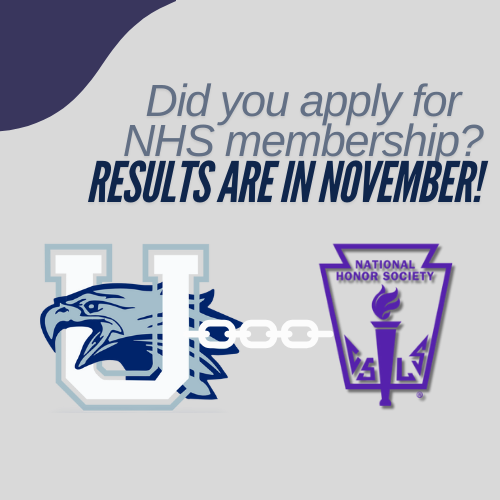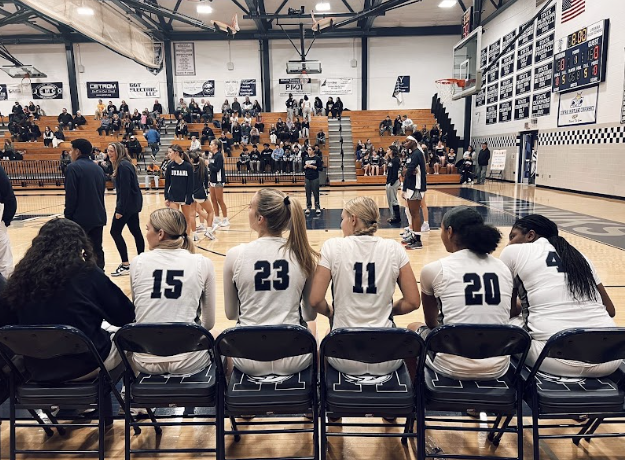Every Fall, hundreds of juniors and seniors at Urbana eagerly send in their applications for the National Honor Society (NHS) with hopes of becoming a member of this renowned group. But why is membership in this society so sought out, and will current applicants become members in November?
NHS is a prestigious academic organization that operates in schools all across the United States. They have numerous chapters, one of which can be found at UHS.
The overall goal of the organization is “for students to be recognized for their excellence in scholarship, leadership, service and character,” according to the club’s adviser Dr. Suzanne Dashiell. She also says that, “having NHS on your college applications is a great addition and shows all of these pillars.”
These pillars are further explored on the NHS website.
The significance of an NHS record on college applications has been emphasized by Dashiell as being important for colleges to understand a student’s character and qualifications. As she puts it, “NHS is a very important item to have on your college apps…it also shows school involvement and your desire to continue community service, which is one of those items that can set you apart in the college app process.”
The National Honor Society’s impact on a student’s character and leadership, its emphasis on student service, and its connection to student communities at large are the factors that motivate the organization, and play a part in why students make the decision to join.
As NHS member Suhaan Pastakia (Class of 2025) puts it, “being in NHS gives me a lot of volunteer opportunities and really makes me feel connected to the community.”
How do students get into NHS? In September, juniors and seniors that are eligible for membership, meaning they have a GPA of 3.5 or above, are required to submit applications for NHS if they wish to join the group.
A high GPA isn’t all that’s mandatory for the process. Applicants will also need to log the community service hours that they have completed over at the years. The more community service hours, the better.
As for the process itself, students that have yet to be accepted into NHS, and existing members, have expressed the ease in the application process. Pastakia says that he “considers the application process not necessarily difficult, because if you have the service hours it shouldn’t be too hard, but just finding them and tracking them down.”
Chris Oh (Class of 2025), an NHS applicant, corroborates this claim: “I don’t think it was difficult. I think for some students who are below 3.5, it can be difficult to get that bumped up, but other than that it’s not very difficult.”
However, he also adds that “there was a bit of confusion I know with me and a few other candidates” regarding the 2024-2025 school year’s application process. Despite this, he says “but other than that, it’s a pretty easy process.”
After the application process is complete, which will take the entirety of October, students will receive notice if they are accepted or denied from membership into the society.
Denial from NHS can be due to a number of reasons. According to Dashiell, the denial reasons include “not having the required 10 community service hours, lack of school activities/involvement, character/behavior issues and procedural items like an incomplete application (lack of signatures, no contact information, no essays, lack of details).”
While all of these denial reasons may seem overwhelming, students should not fret. Regarding the number of applicants that actually get into NHS, Dashiell says that “a great majority of students are accepted, there is no quota or limit as to how many students can be accepted. If you are qualified, you are in.”
Once a student has been accepted into NHS, there are still some steps that need to be taken throughout the year if they want to maintain within the society. “NHS students have to earn 10 community service hours, sign a contract, and pay the dues – this is the minimum,” says Dashiell on what NHS students should do after being accepted into the organization. Pastakia adds onto this, saying that “for NHS, you just do community service, you work within your communities…and represent Urbana in the best way you can.”
Now that applications have already been submitted for review, what should future applicants consider? Regarding this, Oh says “I think they should definitely try their best to get as much experience with different fields of work, especially during the summer if they could sign up to do some jobs like teaching students or just anything that can help them get around more comfortable with the work environment.”
On the same topic, Pastakia suggests that future applicants “should track down their service hours if they don’t have it, definitely get 10 hours and fill out as soon as you can.”
On another important note, future applicants should consider maintaining their character, leadership, and integrity, as well as upholding the pillars of NHS. As Dashiell puts it, “Leadership shows drive and motivation. Many people join many clubs/activities and are the followers, few step up to be the leaders. When you lead, the colleges will see that. Character goes without saying, there is no room in NHS for students who cannot uphold high standards for themselves.”
The organization’s events, scholarships, and programs can all be found online.














